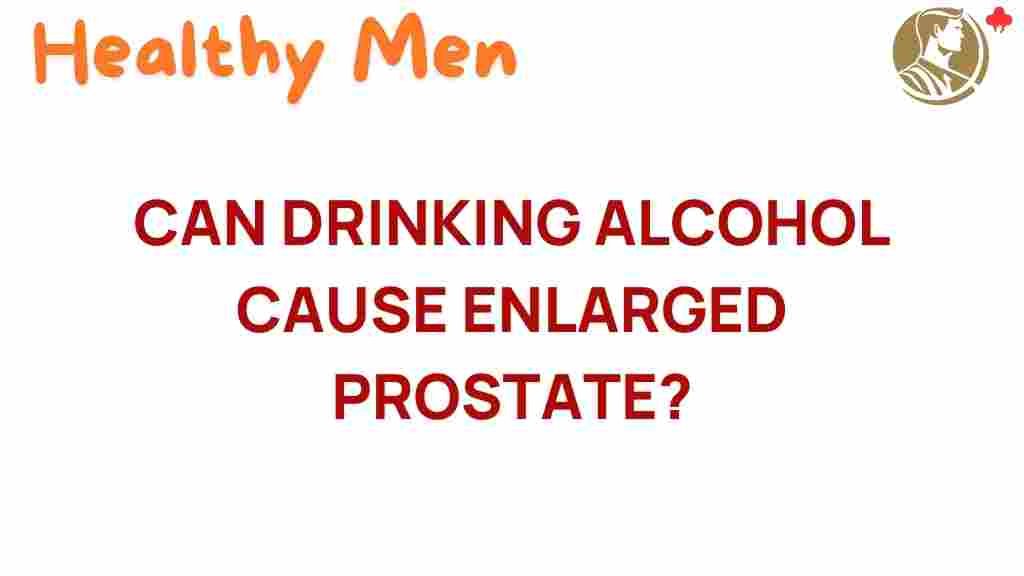Unraveling the Mystery: Can Alcohol Really Cause an Enlarged Prostate?
As men age, they often face various health issues, one of which is an enlarged prostate, medically known as benign prostatic hyperplasia (BPH). This condition can lead to uncomfortable urinary issues, impacting quality of life. A common question among men is whether lifestyle choices, particularly alcohol consumption, can influence prostate health. In this article, we will explore the relationship between alcohol and enlarged prostate, delving into health risks, medical research, and prevention strategies to promote better prostate health.
Understanding the Enlarged Prostate
The prostate is a small gland located below the bladder and surrounds the urethra. Its primary function is to produce seminal fluid, which nourishes and transports sperm. As men age, this gland can become enlarged, leading to various urinary issues such as:
- Frequent urination, especially at night
- Difficulty starting or stopping urination
- Weak or interrupted urine flow
- Inability to completely empty the bladder
While BPH is not cancerous, it can significantly affect men’s health and lifestyle choices. Understanding the risk factors associated with this condition is crucial for prevention and management.
The Connection between Alcohol and Prostate Health
Alcohol consumption has long been debated in relation to various health issues, including prostate health. While some studies suggest that moderate alcohol intake may have protective effects against prostate cancer, others indicate that it could exacerbate symptoms of an enlarged prostate.
Health Risks Associated with Alcohol
Excessive alcohol consumption can lead to several health risks that may indirectly affect prostate health. Some of these risks include:
- Weight Gain: Alcohol is high in empty calories, which can lead to obesity, a known risk factor for BPH.
- Dehydration: Alcohol acts as a diuretic, leading to increased urination and potential dehydration, which can worsen urinary issues.
- Hormonal Changes: Chronic alcohol use can alter hormone levels, potentially impacting prostate growth.
- Inflammation: Heavy drinking can lead to inflammation in various body systems, including the prostate.
Medical Research Insights
Several studies have examined the relationship between alcohol consumption and prostate health. Here are some key findings:
- A study published in the journal Cancer Epidemiology, Biomarkers & Prevention found that men who consumed high amounts of alcohol were more likely to report urinary symptoms related to BPH.
- Another research conducted by the American Urological Association suggested that moderate alcohol intake did not significantly increase the risk of developing BPH, but excessive drinking could contribute to worsening symptoms.
- Research published in The Journal of Urology indicated that men who engage in heavy drinking are more likely to seek medical treatment for urinary issues related to an enlarged prostate.
These studies highlight the importance of understanding how lifestyle choices, including alcohol consumption, can impact prostate health and overall well-being.
Step-by-Step Process for Managing Alcohol Consumption
If you’re concerned about the impact of alcohol on your prostate health, consider the following steps to manage your consumption responsibly:
Step 1: Assess Your Current Alcohol Intake
Keep a journal for a week to track how much alcohol you consume. This will help you identify patterns and areas for improvement.
Step 2: Set Limits
Establish a realistic limit for alcohol consumption based on health guidelines. For men, moderate drinking is typically defined as up to two drinks per day.
Step 3: Choose Healthier Options
Opt for lower-calorie drinks, such as light beers or wine, and avoid sugary cocktails that can contribute to weight gain.
Step 4: Incorporate Alcohol-Free Days
Designate certain days of the week as alcohol-free to give your body a break and reduce overall intake.
Step 5: Stay Hydrated
Drink plenty of water alongside alcoholic beverages to mitigate dehydration and its effects on urinary health.
Troubleshooting Tips for Urinary Issues
If you’re experiencing urinary issues related to an enlarged prostate, consider the following troubleshooting tips:
- Monitor Your Symptoms: Keep track of when symptoms occur and any correlation with alcohol consumption.
- Consult a Healthcare Professional: If symptoms persist, seek medical advice to explore treatment options.
- Adopt a Healthy Diet: Incorporate fruits, vegetables, and whole grains while limiting processed foods to support overall prostate health.
- Stay Active: Regular exercise can help manage weight and improve urinary function.
Prevention Strategies for Prostate Health
Preventing an enlarged prostate and maintaining prostate health involves a combination of lifestyle choices and regular health check-ups. Here are effective prevention strategies:
- Limit Alcohol Consumption: As discussed, moderation is key. Keep alcohol intake within recommended limits.
- Healthy Diet: Focus on a diet rich in antioxidants and healthy fats. Foods like tomatoes, berries, and fish can promote prostate health.
- Regular Exercise: Engage in physical activity for at least 30 minutes most days to support overall health.
- Regular Health Screenings: Schedule routine check-ups with your healthcare provider to monitor prostate health and discuss any concerns.
Conclusion
In summary, the relationship between alcohol and enlarged prostate is complex and influenced by various factors. While moderate alcohol consumption may not pose significant risks to prostate health, excessive drinking can lead to health complications, including worsening urinary issues. Men should be mindful of their lifestyle choices and consider reducing alcohol intake to promote better prostate health.
Ultimately, maintaining a healthy lifestyle through balanced nutrition, regular exercise, and routine medical check-ups can help prevent the complications associated with an enlarged prostate. By making informed choices, men can take charge of their health and improve their quality of life.
This article is in the category Conditions and created by healthymen Team
